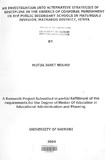An investigation into alternative strategies of discipline in the absence of corporal punishment in the public secondary schools in Matungulu division, Machakos district, Kenya
Abstract
Corporal punishment has been used as a method of discipline in many schools until
the withdrawal by the Ministry of Education Science and Technology (2001). With
discipline being so detrimental to existence of harmony and order in our schools,
alternative strategies of discipline require to be put in place to take the place of
corporal punishment, which has been quite popular.
The purpose of this study was to investigate the alternative strategies of discipline
that teachers in public secondary schools in Matungulu Division have adopted in the
absence of corporal punishment. In the literature reviewed for this study, concept of
discipline and punishment was discussed, causes of indiscipline, alternative
strategies of discipline in school and in particular classrooms.
The ins ruments of data collection were two sets of questionnaire, interview and
observation schedules. The research instruments were tested for content validity
and reliability by means of a pilot study. Data was analyzed using descriptive
statistics where means, percentages and frequencies where used. Chi-square was
used to measure the relationship between the alternative strategies that teachers
preferred to 'use and the independent variables. The study came up with the
following research findings;
All public secondary schools in Matungulu division have embarked on the use of
alternative strategies of discipline after the abolition of corporal punishment. In
dealing with indiscipline, teachers have a range of alternatives that they use namely;
guidance and counseling, punishment, [manual work, extra class work, kneeling
down,] dialogue, having a set of school rules, withdrawal of privileges, and at times
suspension.
The study made the following recommendations;
1. In regard to formulation and' revision of school rules, teachers should be
more involved since they play a major role in the implementation of school rules. Other than involvinq teachers, students who according to the findings
of this study are hardly involved in the formulation and implementation of
school rules ought to be involved since these rules are basically formulated to
govern them. Having a clear set of rules with consequences for non
adherence is an alternative strategy that can enhance school discipline
2. The study recommended that frequent workshops, in-service and refresher
courses on use of alternative strategies of discipline be availed to teachers.
Guidance and counseling training should be given to all teachers irrespective
of their responsibilities since it is the most effective and preferred alternative
strategy.
3. Teachers of public secondary schools should learn to practice a reward-based
•
system of discipline rather than the traditional one of punishment. They
ought to be encouraged to use alternative methods of behaviour
modification, which have a positive impact on student behaviour instead of
. using punishment, which only suppresses behaviour.
The study suggested the following research areas for further research:
1. A comparative study on the alternative strategies of discipline in public
secondary schools in rural and urban set ups.
2. A replication of this study-using interview as the research instrument with
headteachers, teachers, students and parents as the respondents.
3. A study on the attitude of teachers on the use of alternative strategies of
discipline in public secondary schools.
Sponsorhip
University of NairobiPublisher
School of Education, University of Nairobi
Collections
- Faculty of Education (FEd) [6022]

